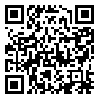BibTeX | RIS | EndNote | Medlars | ProCite | Reference Manager | RefWorks
Send citation to:
URL: http://hdq.uswr.ac.ir/article-1-115-en.html

 , Morteza Moradipour2
, Morteza Moradipour2 
 , Mina Nazari Kamal *3
, Mina Nazari Kamal *3 
 , Sheida Sarafzade4
, Sheida Sarafzade4 
 , Mahboobeh Rouhollahi5
, Mahboobeh Rouhollahi5 
 , Abdoreza Arghaii6
, Abdoreza Arghaii6 
 , Rahele Samouei7
, Rahele Samouei7 

2- Deputy for Relief & Rescue, Red Crescent Society of the Islamic Republic of Iran, Tehran Provincial Branch, Tehran, Iran.
3- Department of Psychology, Faculty of Literature and Humanities, University of Guilan, Rasht, Iran. ,
4- Department of Biostatistics, School of Public Health, Isfahan University of Medical Sciences, Isfahan, Iran.
5- Department of Natural Disaster Management, Faculty of Environment, University of Tehran, Tehran, Iran.
6- Rescue Organization, Red Crescent Society of the Islamic Republic of Iran, Tehran, Iran.
7- Department of Health Management in Disaster, Social Determinants of Health Research Center, Isfahan University of Medical Sciences, Isfahan, Iran.
Background: Evaluating the effectiveness of reengineering Moheb (interventions and sociopsychological supports in disasters) project helps the managers of the Welfare Organization have feedback on the status of community empowerment against disasters. In this regard, this study aimed to determine the effectiveness of reengineering Moheb project to improve the knowledge, attitude, and performance of individuals and local communities in respond to earthquake.
Materials and Methods: This quasi-experimental study with two groups of control and case was conducted in Iran, in 2013. Hormozgan, Isfahan, Fars, and South Khorasan provinces were selected as the setting for the case group and Tehran, Markazi, Semnan, and Khorasan Razavi provinces were selected as the setting for the control group. A total number of 399 samples were assessed using questionnaires of evaluating effectiveness of Moheb project (a=0.704) and checklist of empowerment preparedness of local people. The assessed data were analyzed through independent t test, analysis of variance, Chi-square, Mann-Whitney, and Kruskal-Wallis tests by using SPSS 20.
Results: Based on the results, the proceedings done in the reengineering Moheb project, including organizing local disaster management teams, briefing/training sessions, as well as executed maneuvers have been instrumental in all subscales, i.e. participants of case provinces compared to participants of control provinces were better with regard to knowledge, attitude, and performance.
Conclusion: Regarding the fact that knowledge, attitude, and performance of the people at local communities about earthquake were improved, the interventional programs, especially educational and promotional plan, can effectively empower individuals to face disasters.
Received: 2016/03/1 | Accepted: 2016/06/2 | Published: 2016/07/1
| Rights and permissions | |
 |
This work is licensed under a Creative Commons Attribution-NonCommercial 4.0 International License. |





